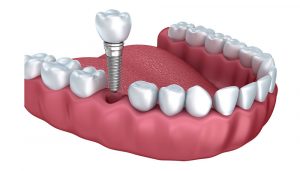There are many possible causes for the loss of teeth – decay, gum disease, and trauma among them. And the consequences are also numerous. People with missing teeth can’t eat normally and may experience nutritional deficiencies due to an inadequate or unhealthy diet. They might also lose self-esteem and feel awkward in social situations, where they may struggle to chew at catered functions and avoid smiling due to embarrassment. On the clinical side, missing teeth can lead to significant bone loss that may cause atrophy in the jawbone.
Traditionally bridge work and removable dentures have addressed the functional and cosmetic consequences of missing teeth, but the main disadvantage of bridges is that they require preparation/cutting of often virgin teeth either side of the bridge, and the main problems with removable dentures have been instability, difficulty of retention, and jawbone loss.
These days, dental implants are the preferred way to replace missing teeth. The cost of treatment with dental implants depends on a number of variables.

A dental implant is a titanium screw surgically inserted into the jawbone in preparation for receiving a crown that will mimic a natural tooth. As this is a surgical procedure involving bone and gum tissue, all patients must meet certain criteria before having a dental implant placed.
First, certain medical conditions must be ruled out; these include poorly controlled diabetes and severe osteoporosis. Next, it is important to determine whether there is sufficient existing bone. Finally, the patient must be prepared – before, during and after the procedure – to maintain good oral hygiene and abstain from smoking, as healthy gums are essential for successful implant therapy and both poor oral hygiene and smoking are risk factors for infection and inflammation around dental implants.
Commonly, candidates for receiving dental implants are triaged by their general dentist. All of their general dental needs, such as basic restorations or general scaling and cleaning, are addressed at the initial stage of the treatment. Later on, the dentist uses a three-dimensional radiograph to make a clinical assessment of the gap left by the missing tooth/teeth and might also create a map of the target zone using surgical planning software.
After these careful measures have been taken, the implant/s can be placed in a single or two-step procedure.
It takes about two to three months for the implant to be integrated with the surrounding bone. After that time, a specialist prosthodontist designs, makes and places the crown on top of the fixture.
If there is bone loss due to trauma, a history of gum disease, or long-lasting infection, a bone grafting procedure is needed before or during the implant placement. This may slightly delay the fitting of the crown. In some cases, occlusion therapy may be advisable after implant treatment; this involves the wearing of a dental splint to protect teeth and their supporting structures from damage caused by grinding or clenching.
As can be seen from all of the above, the cost of dental implants depends on the complexity of the case, the number of fixture/s needed, and the need for a hygiene phase, occlusal therapy or grafting.
When referred by a general dentist, implant candidates have an initial consultation with a specialist prosthodontist who goes through different aspects of the plan and prepares a detailed fee schedule for the entire course. Generally speaking, implants cost $5500 to $6500 each.
